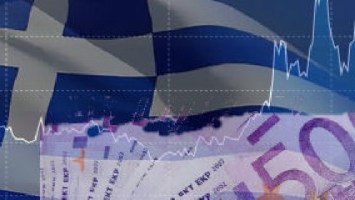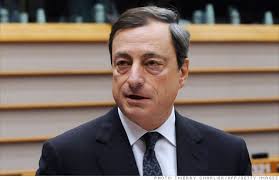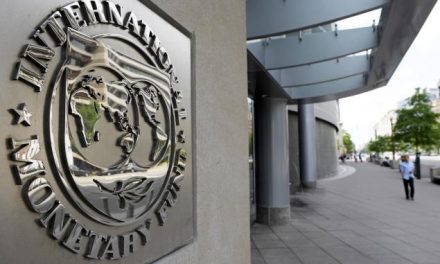By David Goodman, Bloomberg
Greece’s government bonds declined, dragging securities from Spain and Italy lower, amid speculation that early Greek Presidential elections will spark renewed political turmoil.
Greece’s 10-year yield climbed the most in almost eight weeks on concern failure to approve a new president would trigger parliamentary elections in the nation, which returned to the bond market this year after a record bailout. While securities from other periphery countries declined, the selloffs were limited as European Central Bank policy makers debate buying government debt. German bund yields dropped to records on demand for the safest assets as stocks tumbled.
“Greece is still seen as a specific market, but obviously a negative move can impact on other markets,” said Yannick Naud, a money manager at Pentalpha Capital Ltd. in London. “There’s great uncertainty about what will be the make-up of the government and what will be the consequences for bondholders. As long as the ECB remains supportive” there is not a great risk for other periphery nations, he said.
Greece’s 10-year yield increased 94 basis points, or 0.94 percentage point, to 8.18 percent as of 5 p.m. London time, the biggest jump since Oct. 16. The 2 percent bond due in February 2024 fell 4.975, or 49.75 euros per 1,000-euro ($1,241) face amount, to 69.615. The nation’s five-year rate surged as much as 145 basis points to 7.89 percent, the highest level since Oct. 17.
Italy, Spain
Italy’s 10-year yield climbed nine basis points to 2.04 percent after falling to a record 1.942 percent yesterday. Equivalent Spanish rates rose four basis points to 1.83 percent.
Greek Prime Minister Antonis Samaras yesterday brought forward the process of choosing a new head of state to this month. Anti-bailout group Syriza, which currently leads in opinion polls, welcomed the announcement. Samaras is seeking to reduce reliance on Greece’s 240 billion-euro bailout and its accompanying conditions for financial reform.
“Greek bids are the most hit today,” said Marius Daheim, a senior fixed-income strategist at Bayerische Landesbank in Munich. “The elections are an imminent political risk. With yields around 7.5 percent I don’t see Greece going back to the capital market to fund itself.”
Volumes Plunge
Trading of Greek government debt through the electronic secondary securities market, or HDAT, was 44 million euros today, ANA reported. Monthly trading volumes plunged to zero in October 2011 from a peak of 136 billion euros in September 2004, Bank of Greece data show.
The difference between the bid and offer yields for Greek 10-year securities, a measure of the bonds’ liquidity, was about 17 basis points, according to data compiled by Bloomberg. In contrast, the spread on benchmark German bunds was 0.1 basis point.
Greece sparked the euro region’s debt crisis in 2009 after saying its deficit was bigger than previously thought. Over the next three years, the nation’s bond yields jumped to unsustainable levels, sparking contagion that spread to Spain, Italy, Ireland and Portugal.
While today’s broad selloff recalled the crisis, the underlying situation is different. Greek 10-year yields have tumbled from as high as 44.21 percent in March 2012. The rate on similar-maturity Spanish bonds, which peaked at more than 7.75 percent in July 2012, was still about five basis points from a record low of 1.785 percent reached yesterday as speculation of further ECB stimulus insulated the securities from the worst of today’s price declines.
Periphery ‘Underpinned’
“We have some jitters but overall it’s fairly contained,” said Allan von Mehren, chief analyst at Danske Bank A/S in Copenhagen. “It’s just a matter of time before the ECB have to start buying government bonds. When you have that sort of support the periphery is underpinned.”
ECB President Mario Draghi said last week that officials would act should current stimulus be seen as insufficient when it’s assessed early next year. ECB Governing Council member Ewald Nowotny said yesterday that Draghi’s comment that policy makers discussed all assets except gold for any potential QE program was “a bit widely formulated,” he said, adding “we’re thinking specifically about government bonds.”
A round of targeted longer-term loans from the ECB to banks this week, part of stimulus plans intended to add as much as 1 trillion euros to the institution’s balance sheet, won’t even cover the repayments they owe from a previous program, according to a Bloomberg survey of analysts.
Germany’s 10-year yield dropped three basis points to 0.685 percent, the lowest level since Bloomberg started tracking the data in 1989. The nation’s 30-year rate declined six basis points to a record 1.541 percent.
The Stoxx Europe 600 Index (ASE) of shares fell for a second day, dropping 2.3 percent. The Athens Stock Exchange Index slumped 13 percent today, the most since December 1987, according to data compiled by Bloomberg.
Greek government securities returned 16 percent this year through yesterday, Bloomberg World Bond Indexes show. Germany’s earned 9 percent, Italy’s 15 percent and Spain’s 16 percent.



















